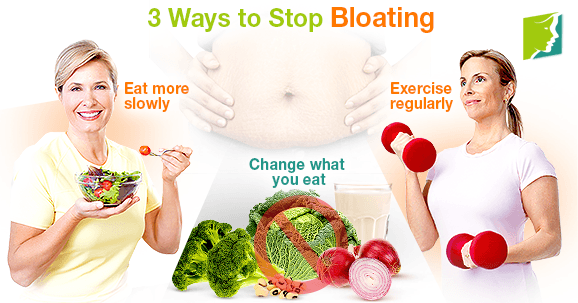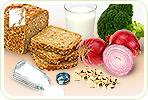Bloating, a feeling of tightness of fullness in the abdomen, is normally caused by trapped gas in the intestine or water retention, and it can be uncomfortable or even painful. The problem is generally short term, but it can be a nuisance if it happens frequently, so many people want to know how to stop bloating. Keep reading to learn some safe and effective ways to do this.
Change What You Eat
There is a number of foods that are more likely to lead to bloating for various reasons, so cutting down on consumption or removing them from the diet altogether could potentially reduce or eliminate the problem. The main culprits are beans, broccoli, onions, and cabbage, as these foods are known to release gases in the intestine that then find it hard to escape. It might also be worth cutting out dairy to see how you feel, because some people are unaware they have developed lactose intolerance, which can cause bloating. Read on to set your weekly plan to stop bloating.
Eat More Slowly
Eating too fast is likely to result in trapped intestinal gas. First, you are more likely to swallow air, and this could have a hard time escaping from the body. In addition, the food bypasses the chewing process to some extent, so the stomach has to digest bigger chunks. This can lead to the food sitting in the body for longer, thereby releasing gas. Last, the digestive enzymes in the saliva are designed to begin the breakdown of what you are eating. This also slows the digestive process, leading to increased intestinal gas.
Exercise Regularly
Gas in the body is actually quite normal, but bloating occurs when it cannot escape in the normal way. In order to help release gas that might have become blocked, exercise can help. This explains why people with an active lifestyle rarely complain of bloating. It is not advisable to exercise right after eating, but exercising after half an hour to an hour should stop bloating.
Recommendations
In addition, to get rid of bloating, you should be well hydrated, so drink the equivalent of eight glasses of water each day. Likewise, instead of three big meals per day, try eating smaller meals more often. This can keep you free of the bloated feeling and manage blood sugar levels and hunger. Finally, try to keep stress levels low. Stress and anxiety can divert the body's energy away from the digestive system.
Bloating is common, but it is reasonably easy to treat. There is no medical remedy for bloating itself unless it is caused by an underlying medical condition, but home remedies usually prove to be effective. By following the tips above, you should be able to reduce or even stop your bloating.
Sources
- American College of Gastroenterology. (2014). Digestive Health Tips. Retrieved November 20, 2014, from http://patients.gi.org/topics/digestive-health-tips/
- Mayo Clinic Staff. (2011). Women's health. Retrieved November 20, 2014, from http://www.mayoclinic.org/healthy-living/womens-health/in-depth/water-retention/art-20044983
- National Health Service UK. (2014). Beat the bloat. Retrieved November 20, 2014, from http://www.nhs.uk/Livewell/digestive-health/Pages/beat-the-bloat.aspx
- National Institutes of Health. (2014). Gas - flatulence. Retrieved November 20, 2014, from http://www.nlm.nih.gov/medlineplus/ency/article/003124.htm




